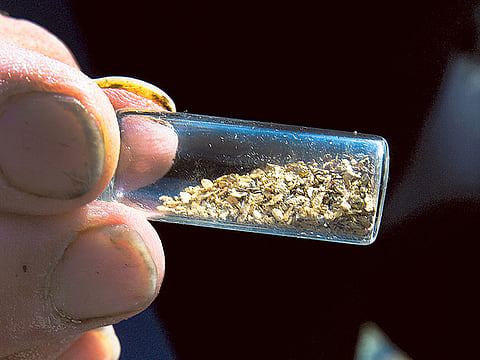Gold industry wants mines to play by 'sustainable development' rules, says World Gold Council
Smaller mines are still causing most of the problems and giving industry a bad rep

Dubai: Some of the heightened ‘sustainable development’ awareness is rubbing off on the world’s gold mine operators – but there are still holdouts and that’s where the problems still lie deep. And getting them into the mainstream of the mining industry is proving difficult.
“Small-scale gold mining is very different in nature to large-scale, by operating at much lower levels of capital investment and technological sophistication,” said Terry Heymann, Chief Financial Officer at World Gold Council. “As such, there are unfortunately many instances where “artisanal” gold mining is associated with poor social and environmental practices.
“The World Gold Council supports the formalisation of artisanal gold mining, which can help address these poor practices. But this can only happen with the engagement and support of governments, communities and the development sector, who all have a role to play in helping address challenges associated with current practices.”
But can there ever be enough checks?
Under the current framework, all companies in the supply chain have a responsibility to ensure the gold they source is "responsibly mined". The World Gold Council works with the LBMA (London Bullion Market Association), which has set out in their 'Responsible Gold Guidance' the steps refiners need to take when undertaking due-diligence on the gold they receive. Refiners who do not conform will be removed from the LBMA’s accreditation list which means that they will no longer be able to supply gold into the international wholesale gold markets.
A need for change
And it’s the practices at such small gold mines that end up giving a bad name to the whole industry. At these pits, shoddy worker treatment is often the norm, and even children are dragooned into operating there. Gold brought up from these mines often get diverted for smuggling and the proceeds line the pockets of a few.
These are practices that WGC wants to change – but for now, it’s looking to bring in best practices at the larger mine operators. Last year, it brought out the ‘Responsible Gold Mining Principles’, which “clearly set out what constitutes responsible ESG principles for large-scale gold,” said Heymann.
“The Principles were developed over two years, with significant engagement and input from a broad range of stakeholders. It is a robust set of Principles that should give confidence to investors and customers that the gold has been produced responsibly. All WGC members have agreed to implement these Principles, which are now a requirement of membership.”
Under the Principles, mine operators need to monitor social and governance risks – and moreover, they are required to publicly disclose their conformance and receive external assurance on this disclosure.”
Being responsible
On Tuesday, the WGC brought out a report – ‘Gold Mining’s Contribution to the UN Sustainable Development Goals’ – that laid out the progress made… and what more needs doing. It includes 39 case studies on how members are bringing about positive change across four areas - global partnerships; social inclusion; economic development; and responsible operations, energy and the environment.
* Global partnership: Case studies show a wide-ranging malaria programme as well as partnerships that provide water education and medical supplies to communities.
* Social inclusion: WGC members are committed to improve social inclusion in the countries they operate, including support a more gender inclusive workplace, opening up opportunities for indigenous people, and strengthening their human rights track-record.
* Economic development: WGC members support the socio-economic development of the communities in which their mines are located. This is through targeted investment in - and creating - direct and indirect jobs for locals, working with farmers to share their produce, bringing down mortality rates with nursing and midwifery training, strengthening public health systems and tackling infectious diseases such as malaria and TB and supporting education programmes.
* Responsible operations, energy and the environment: Gold mining companies have made significant strides in reducing energy and water use. This is highlighted in the report by increasing use of renewable energy as well as projects that look to minimise the volumes of water used at mine sites while also ensuring that local communities have access to clean water and sanitation.
Not change course
“The UN’s deadline of 2030 to meet its Sustainable Development Goals will soon be upon us and it is vital that the pandemic is not allowed to postpone the progress made to date," said Heymann. "While it presents its own challenges, the current situation has brought the need for sustainable business practices to be at the heart of everything companies do."
Sign up for the Daily Briefing
Get the latest news and updates straight to your inbox








